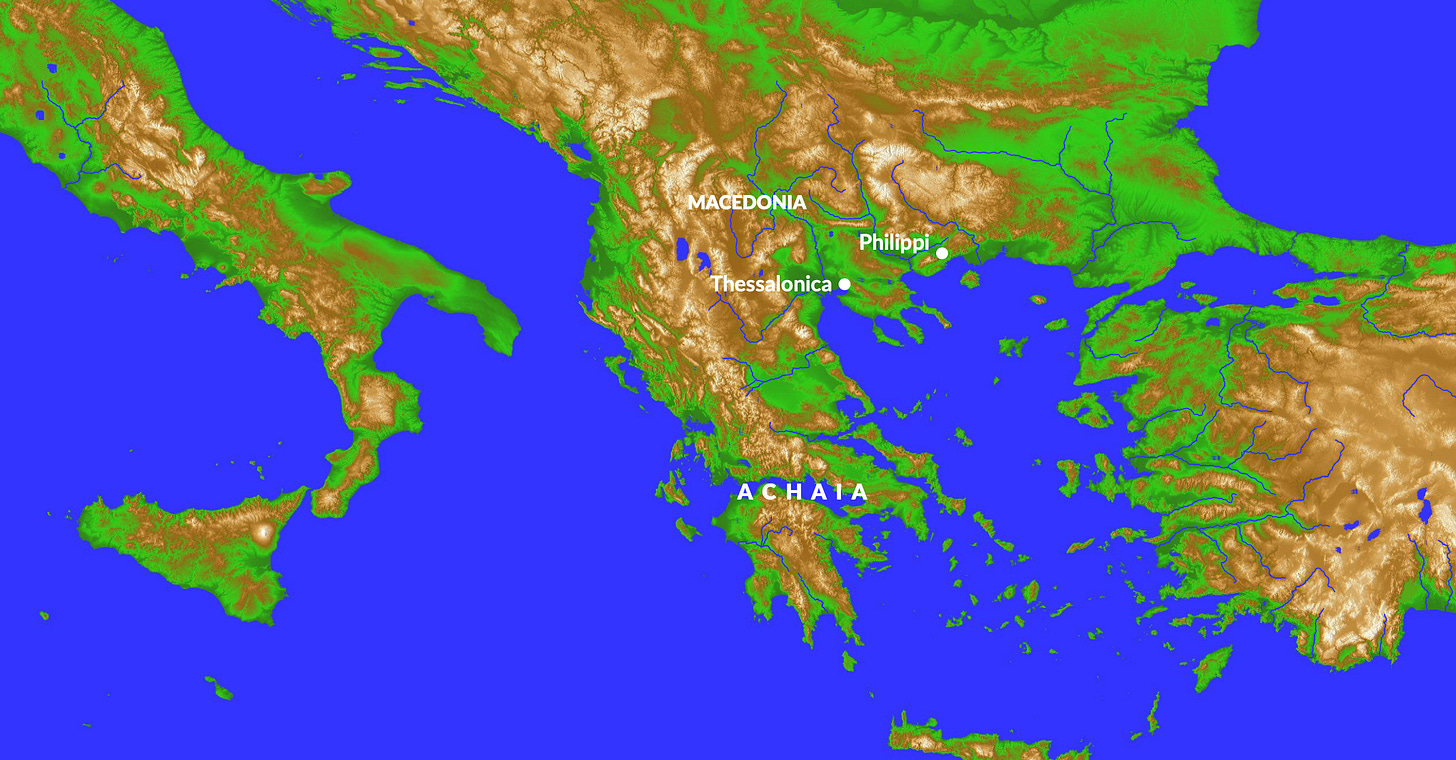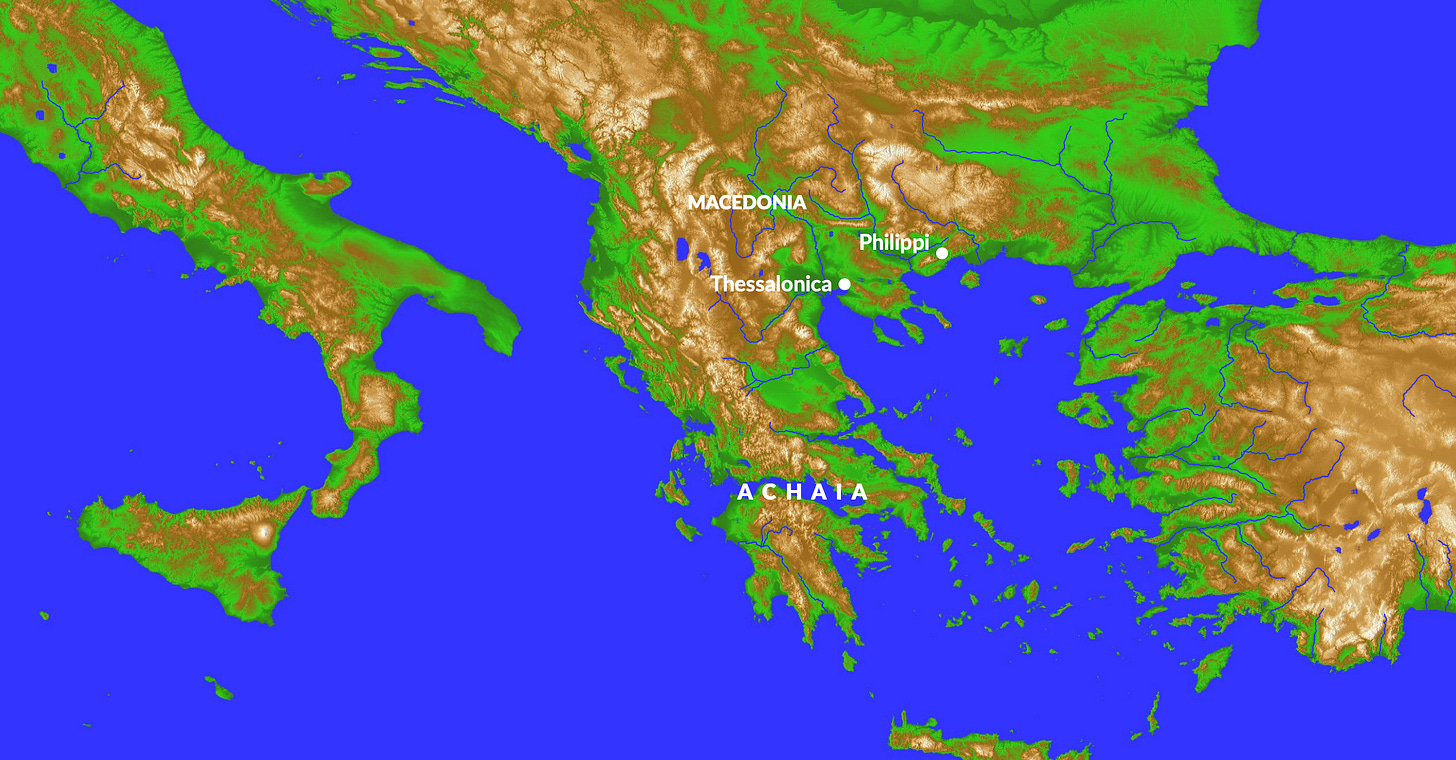Daily Scripture Reading 1Thessalonians 1:1 - 2:12
Imagine you traveled to a city and preached the truth about Jesus, but then were beaten with rods, thrown in jail overnight by those who oppose the truth, and then sent out of that city the next day. What would you do next? Would you travel to a different city and preach boldly, taking the risk that you would be mistreated again? Or would you tone down your message and try to make it less offensive? Would you stop preaching altogether and simply go home?
That scenario happened to Paul. He preached in Philippi, and was beaten and driven out of the city. The natural human response would be to either stop preaching or tone down the message to avoid more suffering. However, Paul did not choose to do the safe thing. Instead, he traveled to Thessalonica and preached just as boldly as he had preached in Philippi.
Some time later, Paul wrote a letter to the church in Thessalonica and reminded them of his boldness. Today, we begin reading this letter, which we call 1 Thessalonians.
1Th. 1:1 ¶ Paul and Silvanus and Timothy, ¶ To the church of the Thessalonians in God the Father and the Lord Jesus Christ: Grace to you and peace.
Paul wrote this letter to the Thessalonians. Paul’s first visit to Thessalonica took place during his second missionary journey and is recorded in Acts 17.
Thessalonica was located in the area known today as the country of Greece.
1Th. 1:2 ¶ We give thanks to God always for all of you, making mention of you in our prayers;
1Th. 1:3 remembering without ceasing your work of faith and labor of love and steadfastness of hope in our Lord Jesus Christ before our God and Father,
1Th. 1:4 knowing, brothers beloved by God, your election,
1Th. 1:5 for our gospel did not come to you in word only, but also in power and in the Holy Spirit and with full assurance; just as you know what kind of men we proved to be among you for your sake.
According to Acts 17, when Paul arrived in Thessalonica, he spend three Sabbaths reasoning with the Jews, showing that the Christ had to suffer and that Jesus is the Christ. Many were persuaded and agreed with Paul, but the Jews became jealous and created a civil disturbance, with the result that the brothers sent Paul out of the city.
Paul reminded the Thessalonians of this as proof that Paul did not act alone; instead, he was ministering in the power of the Holy Spirit.
1Th. 1:6 You also became imitators of us and of the Lord, having received the word in much affliction with the joy of the Holy Spirit,
Take note of the phrase “received the word in much affliction”. The civil disturbance created by the Jews to resist Paul affected all the believers in Thessalonica, not just Paul. Because of Paul’s courage, the Thessalonians also acted courageously.
If we act courageously when we endure persecution, we can inspire others to also act courageously in the fact of opposition to the truth of Jesus Christ.
1Th. 1:7 so that you became a model to all the believers in Macedonia and in Achaia.
Thessalonica was a city in the Roman province of Macedonia. Achaia was a Roman province south of Macedonia.
1Th. 1:8 For the word of the Lord has sounded forth from you, not only in Macedonia and Achaia, but also in every place your faith toward God has gone forth, so that we have no need to say anything.
1Th. 1:9 For they themselves report about us what kind of an entrance we had with you, and how you turned to God from idols to serve a living and true God,
1Th. 1:10 and to wait for His Son from heaven, whom He raised from the dead, Jesus, who rescues us from the wrath to come.
Notice the word “wrath”. Paul wrote that Jesus saves us from the wrath to come.
In recent decades it has been fashionable for Christianity to avoid preaching fire and brimstone. The mentality is that people only want to hear positive statements about our religion. However, the future wrath is a reality, and Jesus is the only way to escape that wrath; therefore, we should tell people how to escape the wrath just as Paul did.
1Th. 2:1 ¶ For you yourselves know, brothers, that our entrance to you was not in vain,
1Th. 2:2 but after we had already suffered and been mistreated in Philippi, as you know, we had the boldness in our God to speak to you the gospel of God amid much struggle.
Paul’s mistreatment in Philippi is recorded in Acts 16. A servant girl who had a spirit of divination was following Paul, so Paul cast the spirit out of her. When her masters knew their hope of profit was gone, they dragged Paul and Silas before the magistrates. Paul and Silas were beaten and thrown in jail. That night while Paul and Silas were praying and singing in jail, an earthquake struck, but the prisoners did not leave. The jailor and his family became believers. The next day Paul left the city.
A normal human reaction to that series of events would be to tone down the message, and try to avoid creating more opposition. Despite all the suffering and opposition Paul experienced in Philippi, when Paul arrived in Thessalonica, he preached boldly, not timidly. He did not water down his message.
Christianity faces much opposition in the 21st century. Those who oppose our belief system are trying to intimidate us and get us to water down our message. We must not do that. We must follow Paul’s example and preach the truth clearly and boldly.
1Th. 2:3 For our exhortation does not come from error or impurity or by way of deceit;
1Th. 2:4 but just as we have been approved by God to be entrusted with the gospel, so we speak, not as pleasing men, but God who examines our hearts.
Paul spoke courageously despite the suffering because he was more concerned with pleasing God than he was with pleasing man.
Man’s approval or disapproval is obvious and immediate; whereas, God’s approval or disapproval is in the future. Therefore, it is easy for Christians to fall into the trap of being more concerned with man’s approval than God’s approval.
1Th. 2:5 For we never came with a flattering word, as you know, nor with a pretext for greed—God is witness—
1Th. 2:6 nor seeking glory from men, either from you or from others, even though as apostles of Christ we could have been a burden to you.
As an apostle, Paul had the right to expect financial support from the Thessalonians. However, Paul did not flaunt his rights. He sacrificed them.
1Th. 2:7 But we proved to be gentle among you, as a nursing mother tenderly cares for her own children.
1Th. 2:8 In this way, having fond affection for you, we were pleased to impart to you not only the gospel of God but also our own lives, because you had become beloved to us.
1Th. 2:9 ¶ For you remember, brothers, our labor and hardship, how working night and day so as not to be a burden to any of you, we proclaimed to you the gospel of God.
1Th. 2:10 You are witnesses, and so is God, of how devoutly and righteously and blamelessly we behaved toward you believers;
1Th. 2:11 just as you know how we were exhorting and encouraging and bearing witness to each one of you as a father would his own children,
1Th. 2:12 so that you would walk in a manner worthy of the God who calls you into His own kingdom and glory.
Paul endured persecution when he preached in Philippi. When he left Philippi, he traveled to Thessalonica, but he did not change his message in order to avoid more persecution. He boldly preached the truth, despite the risks.
What are some ways that modern opponents of Christianity are trying to intimidate Christians into being silent or watering down the truth found in the Bible?
What are some examples of so-called Christians caving into the pressure and making their message conform to the world?
What are some examples of bold Christians continuing to preach the truth despite the opposition they face from the world?
Thanks for visiting Bible Mountain. If you have already joined my email list, thank you and please tell others about Bible Mountain. If you have not joined my email list yet, please do so now. In order to join, go to Bible Mountain dotcom, click on subscribe, and that will take you to a page where you can sign up. Your email address will not be sold nor given away. Once again, thanks for visiting Bible Mountain.
“Scripture quotations taken from the (LSB®) Legacy Standard Bible®, Copyright © 2021 by The Lockman Foundation. Used by permission. All rights reserved. Managed in partnership with Three Sixteen Publishing Inc. LSBible.org and 316publishing.com.”


